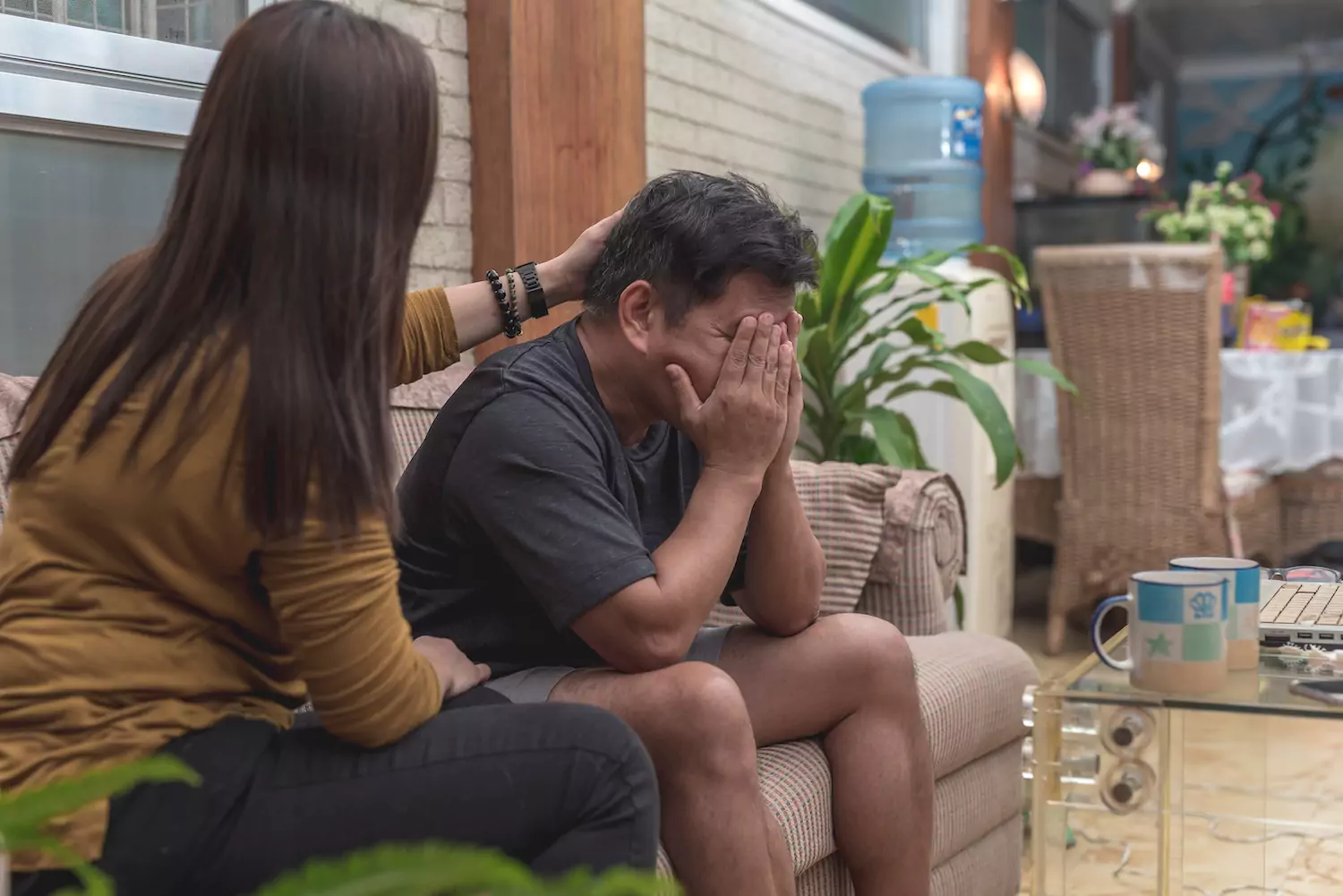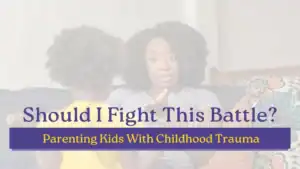Estimated reading time: 11 minutes
Why does he want to be by himself? Why does he seem so angry? Questions tormented Hope’s* thoughts. Her husband, Phil, had returned from deployment a different man, and she wanted to understand why. Eventually, she got her answer: post-traumatic stress disorder (PTSD) — an answer that fueled even more questions, such as, What will this mean for us? Will he get better? Can we still be a family? Can PTSD and marriage even coexist?
When Phil got back, Hope looked forward to recapturing the emotional intimacy they had shared as soulmates before he left. Instead, she got a close-lipped spouse who did not want to discuss what happened “over there.” What is hidden behind this new partition of concealment, she wondered. Since they had always been open and transparent with each other, she assumed she had permission to find out. She did not realize her husband’s condition revoked her permission.
Hope pressed Phil to talk about the secrets he kept private. He reacted with anger to protect himself and push her away. He said, “Why should I tell you about what happened when I don’t want to think about it myself?” She recoiled with hurt and resentment.
Trauma occurs when a person experiences a threat or harm to him- or herself or others, such as combat situations, rape, sexual assault, accidents, domestic violence, natural disasters or a confrontation at gunpoint or knifepoint. This can include situations in which police officers and first responders witness trauma to others.
About 7 to 8 percent of people in the U.S. will suffer PTSD in their lifetime. In a given year, 8 million adults have PTSD; 10 percent of those are women, and 4 percent are men.
For spouses and victims of PTSD, healing may feel like an endurance event. But there is hope. The belief that a person with PTSD cannot recover is no longer valid. Treatment and supportive relationships can help heal the inner injuries of a person battling PTSD and mitigate PTSD’s impact on marriage relationships.
The hidden wounds of PTSD
When you see an amputee, his or her wounds and losses are somewhat obvious. But when your spouse struggles with PTSD, neither of you may know it. He conceals his emotional wounds to avoid feeling vulnerable. Her anger pushes others away and protects her from exposing her emotional scars. His reactions only hinder him from getting the help he needs to heal. She shuffles through each day like the walking wounded.
Emotional wounds may take time to manifest for several reasons. First, the victim of trauma may not realize how hurt he or she is from the threat or assault. Second, we all have a natural tendency to cover up a wound. If our arm gets hurt, we instinctively put our other hand over it. If our head hurts, we place our hands on the ache. But when a wound is so deep we cannot put our hands on it, we find emotional ways to cover it up.
Third, a victim of PTSD may live with shame about feeling hurt, vulnerable, or powerless. The survivor may want to deny the effects of trauma or pretend it did not happen. He or she wants to get on with living a normal life.
PTSD symptoms and reactions
Regardless of the traumatic event that caused them, the pattern of PTSD symptoms tends to be consistent. Identifying these symptoms helps survivors and spouses understand how the disorder affects their marriage. Organizations such as the National Center for PTSD review the warning signs of PTSD.
The four general PTSD symptom areas are:
- Re-experiencing the trauma.
- Avoidance.
- Hyperarousal.
- Changes in beliefs and mood.
Here’s what these symptoms may look like on a daily basis. Survivors may:
- Disconnect (emotionally detach) from interpersonal relationships and avoid interaction with others.
- Shut down or become emotionally numb.
- Use anger and irritability to push away the spouse or caregiver, yielding the high price of toxicity to intimacy.
- Act out aggressively, both verbally and physically. (Spouses of veterans with PTSD experience more violence, often requiring significant intervention for the spouse’s safety and protection.)
- Avoid going out in public because of fear, heightened sensitivity, and hypervigilance for threats.
- Sit against a wall with a clear view of doors and exits when in public.
- Struggle with sleep because of fear, a heightened alertness to sounds, or nightmares.
- Display addictive behavior, such as workaholism, to avoid and distract from the trauma.
These behaviors affect marriages in a number of ways, but those with the most impact are emotional detachment, numbness, anger, and irritability.
PTSD effects on marriage
Not only can PTSD drive a wedge between a husband and wife, but it can also devastate marriages. A research article from the National Center for PTSD shows that veterans with PTSD have more marital problems than veterans without the condition. Survivors suppress their thoughts and feelings from their partner, worry more about intimacy issues, and have lower sexual interest and satisfaction. Research found Vietnam veterans with PTSD got divorced twice as much as those without PTSD, had shorter relationships, and were three times more likely to have two or more divorces.
Spouses of Vietnam veterans reported less happiness and life satisfaction, more discouragement, and felt emotionally overwhelmed. Even husbands of female veterans with PTSD reported a lower sense of well-being and more social isolation.
The research on spouses of noncombat PTSD survivors seems to be more limited, but the spouses of people who were raped, threatened at gunpoint or lived through a natural disaster are likely to struggle with similar effects.
PTSD and intimacy in marriage
PTSD wounds the intimacy in marriage because it dismantles the emotional connection. Emotional intimacy is formed through a developmental process. The prerequisite conditions for intimacy include safety, trust, power, control, and esteem.
A key way that trauma injures these preconditions for intimacy is by changing or reinforcing beliefs. For example, as a child you may have believed I am safe or the world is OK to explore because your parents protected you, you lived in a safe neighborhood, and the people around you were kind and respectful. However, those trust beliefs may change to people are dangerous, and I could get hurt after a traumatic event. Even without a basis, survivors could apply and overgeneralize faulty beliefs toward their spouses. It’s nearly impossible to be emotionally intimate when a victim believes his or her spouse is a threat.
Likewise, trust is another vital precondition to intimacy, but trauma also erodes trust-forming beliefs, such as I don’t know who I can trust and I can’t trust anyone. Trauma can make the survivor feel powerless and out of control, which can lead to thoughts such as Others will take advantage of me, I will be abused or I must be in control.
Self-esteem is another key precondition for intimacy; an important principle here is that identity precedes intimacy. Developmentally, we form our identity in our late teens and early 20s, deciding what career we will pursue, whether we will go to college, enter the military, or learn a trade. Typically, once someone decides “Who am I?” that person moves on to addressing “Whom do I want to be with?”
But, when trauma attacks esteem, the survivor may feel devalued as a person — he may feel like a replaceable part. She may feel she deserves punishment. If a trauma survivor thinks he is no longer lovable and dislikes himself, he cannot perceive that others still love him and receive love from them. A trauma survivor may think, How could you really love me when I don’t like myself?
Care for the PTSD caregiver in marriage
Hope found that being a spouse and caregiver to a trauma survivor challenged her own emotional stability. She wanted to help Phil bear his burden (Galatians 6:2), but he kept pushing her away. As she carried greater responsibility for the tasks around the house and within the family, she felt her needs were unmet.
A friend invited her to a support group for wives of men with PTSD. There she learned about “caregiver burden.” She discovered that caregivers often suffer emotional fatigue and detach from the spouse with PTSD. Hope realized she needed to take care of her own mental, emotional, physical, and spiritual needs as she and Phil walked through a long and winding valley of life together.
Spouses of veterans with PTSD are more likely to develop mental health problems than are spouses of veterans without the disorder. Often, the victim’s ordeal triggers a secondary traumatization toward his spouse. The survivor may displace outrage onto his caregiver, mirroring the anger he received from the traumatic event. This could even take the form of physical aggression and domestic violence. Some PTSD experts suggest caregivers can even form “vicarious PTSD,” a strong empathy that elicits symptoms of despair in the caregiver. It is vitally important that PTSD caregivers take care of themselves.
Treatment for PTSD
The good news is that a person who suffers trauma can recover. Mental health professionals do not use the word cure because it implies that all the symptoms will go away and never return. But survivors can improve and lessen the effects of PTSD on themselves and their marriages.
According to the National Center for PTSD, 53 percent of those who received trauma-focused psychotherapy and 42 percent who took medication improved to the level that their symptoms no longer met PTSD diagnosis criteria. A spouse must encourage the trauma survivor to get treatment, because PTSD is unlikely to go away on its own.
With encouragement from Phil’s doctors and Hope, Phil joined group therapy. He realized he was not alone and that others had experienced situations similar to his. The group helped him feel less socially isolated as he learned about interpersonal relationships. He learned how to regulate and manage his emotions better, becoming less angry and more engaged. He used what he learned to strengthen his marriage.
Experts have developed several types of evidence-based psychotherapies for PTSD. Treatment can reduce PTSD and related depression over the course of 12 to 16 sessions. One is cognitive processing therapy (CPT), a type of cognitive behavioral therapy for individuals or groups. Trauma survivors can make substantial progress in the recovery process due to changing their thoughts and beliefs. Therapists teach survivors how to identify unhealthy thoughts, challenge those mindsets, and install new thoughts. CPT aligns with the principle from 2 Corinthians 10:5 to “bring into captivity every thought to the obedience of Christ.” There are also other individual therapies for PTSD, such as prolonged exposure therapy, Eye Movement Desensitization and Reprocessing (EMDR), and Skills Training and Affective Interpersonal Regulation (STAIR).
A beneficial treatment for couples is Cognitive-Behavioral Conjoint Therapy. It is designed to reduce individual PTSD symptoms and improve relationships. Similar to CPT, the survivor and spouse work to identify the thoughts and behaviors of PTSD and how those symptoms affect their relationship.
Recovering intimacy with PTSD in your marriage
While emotional intimacy is usually a marriage’s foundation, PTSD can severely erode it. Many couples lose hope for the relationship. But hope abounds through therapy and through spiritual resources.
Physical intimacy between two bodies is an expression of sexual, romantic love, but it is not enough to sustain a marriage. Emotional intimacy is a deeper soul-to-soul connection of friendship, love, with the mind, will, and emotions. But it can still be a conditional love: “I will love you as a friend as long as (fill in the blank).”
But there is a deeper type of spirit-to-spirit intimacy, based upon the more enduring, unconditional agape love. It is not based on feelings or the spouse’s behavior, but on the decision and will of the lover. This is God’s type of unconditional love for us, which we can share with our spouses. This type of spiritual love “bears all things, believes all things, hopes all things, endures all things. Love never fails.” (1 Corinthians 13:7-8, NKJV).
Agape love can provide the resilience you need to help you and your spouse recover from PTSD. God desires to heal the brokenhearted and bind up the wounds (Psalm 147:3) of the PTSD survivor and the caregiver. His love can help you be hopeful in your marriage.
Resources for PTSD recovery
Caregivers and victims of PTSD should seek help to recover. Here’s a short list of resources to get you started:
- Focus on the Family can help you find a Christian therapist in your area. Call Monday through Friday from 6 a.m. to 8 p.m. (Mountain time) 855-771-HELP (4357).
- The American Association of Christian Counselors has a number of trauma-recovery resources. The organization can also help you find a counselor.
- The National Center for PTSD has several articles and resources for family members and a mobile app called PTSD Family Coach.
- The VA Caregiver Support Line (855-260-3274) and website provide support for family caregivers of veterans.
- Look for other books about coping with trauma at a Christian bookstore or at Focus on the Family’s online bookstore.
* Hope and Phil are a fictional couple; however, their struggle represents those various individuals and couples with whom Dr. Vaughan has worked.
A variety of marital issues can lead to challenges or even hopelessness for one or both spouses in a marriage. Gaining a sense of hope and direction often requires understanding the underlying issues and relationship patterns which may have led to the crisis. Reach out to well-trained helpers even if you are the only person in the marriage willing to take action at this time. We can guide you as you seek a referral and take your first steps toward recovery. You can contact us Monday through Friday from 6 a.m. to 8 p.m. (Mountain time) at: 855-771-HELP (4357) or help@FocusOnTheFamily.com www.FocusontheFamily.com/Counseling













